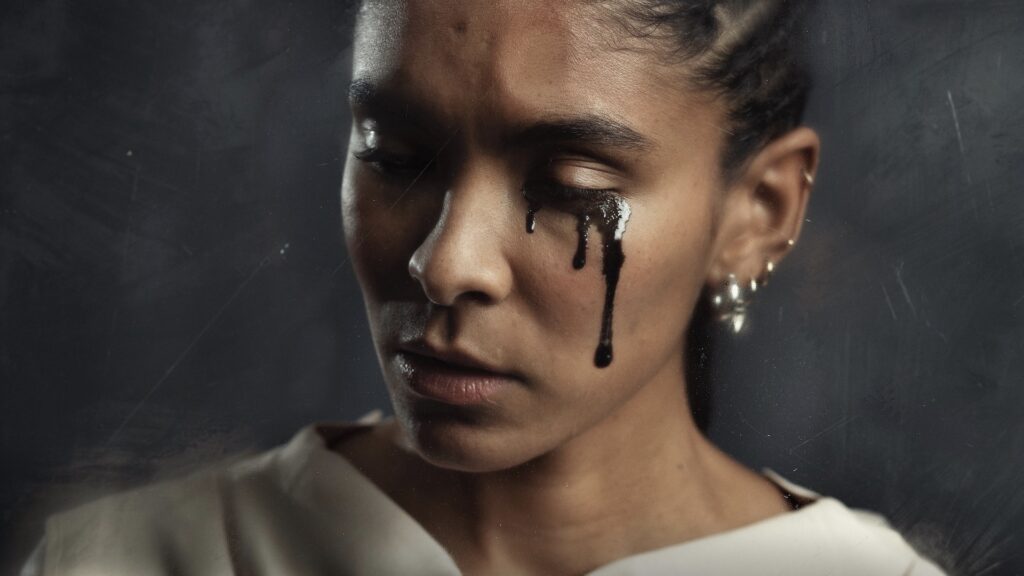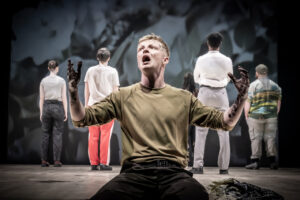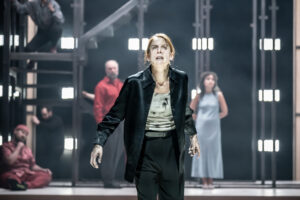
18 March – 8 April
Pace, energy and power politics ripple far beyond the world of ancient Rome in this stylish new production of Julius Caesar. In his debut season at the Royal Shakespeare Theatre, director Atri Banerjee has introduced a distinct collaborative vision of the play in which every character matters. The theme of inclusion is highlighted towards the end when the revolving structure that has served as street, homes, Senate and battlefield, is eerily transformed into a house of the dead from which the victims of assassination, grief and war gaze mournfully on the living while the butchery continues. And the sense of impending doom is enhanced by the chorus of black clad women drawn from the local Stratford community whose eloquent watchfulness acts as a terrifying silent tribunal.
Overall, this was a disturbing evening, set in a time not unlike our own, opening with choreographed balletic and athletic movements by the company, hinting at the repetitive societal rituals to be sliced through by the blade of the Soothsayer’s prophecy. Catastrophe is further foreshadowed in the throbbing atmospheric score, performed by five musicians, three of whom stand aloft to gaze down on the action.
This is a play steeped in blood. But our first glimpse of it, in Portia’s self-inflicted wound, is not scarlet but glistening black. And so it continues. Oil is the obvious inference, and the substitution of monochrome for colour brings other suggestions, the crusted edge of old injuries, daubs of paint, inscriptions, mortality itself. Black blood also allows an audience that instinctively shrinks from gore to confront the violence headlong.
But while both moving and distressing, the production is not without its problems. Theatre at its best provokes inquiry and that is undoubtedly the intention here. A programme note makes the bold claim that this play invites ‘questions of gender’. The nature of these questions is never spelled out. Clearly, Shakespeare’s Rome was a crudely patriarchal society. The two female characters, Portia and Calpurnia are defined largely through their relationships with the principal men. By casting the conspirators as women, the production may be making an obvious point about male power. Alternatively, it may just be a means to ensure parity of casting. Whatever the rationale, the real challenge lies in the inevitable rewriting of the text this involves. The play is full of references to ‘man’ and ‘men’. Yet in this reimagining, Brutus and Cassius are described throughout as ‘she’. As a result, individual lines jar, as when Cassius tells Brutus they risk being ‘womanish’. The most jarring moment of all comes in Mark Anthony’s great speech, in which Brutus is continually described as an ‘honourable man’. This feels just about credible but with the ironic conclusion that ‘she is an honourable man’ it is hard not to be jolted from our willing suspension of disbelief.
As to the performances, each of the principals has a strong stage presence. William Robinson’s Anthony is fiercely charismatic,

while Kelly Gough’s Cassius has a ferocious passion that verges on mania.

Thalissa Teixeira is an unusual Brutus. Elegant, poised, but increasingly distraught, her transformation from reluctance to commitment, defeat to despair, shows how conspiracy and violence shatters lives.

As such, she evokes sympathy, though the rapid conversational tone of her diction meant that some of her lines are lost in elision. There has been an ongoing discussion about how the language should be delivered in the twenty first century. Should it be declaimed as blank verse, or spoken conversationally? Each method has its merits. And both require good projection. Above all else, Shakespeare needs to be heard.
★★★★☆ Ros Carne 29 March 2023
Photo credit: Marc Brenner


